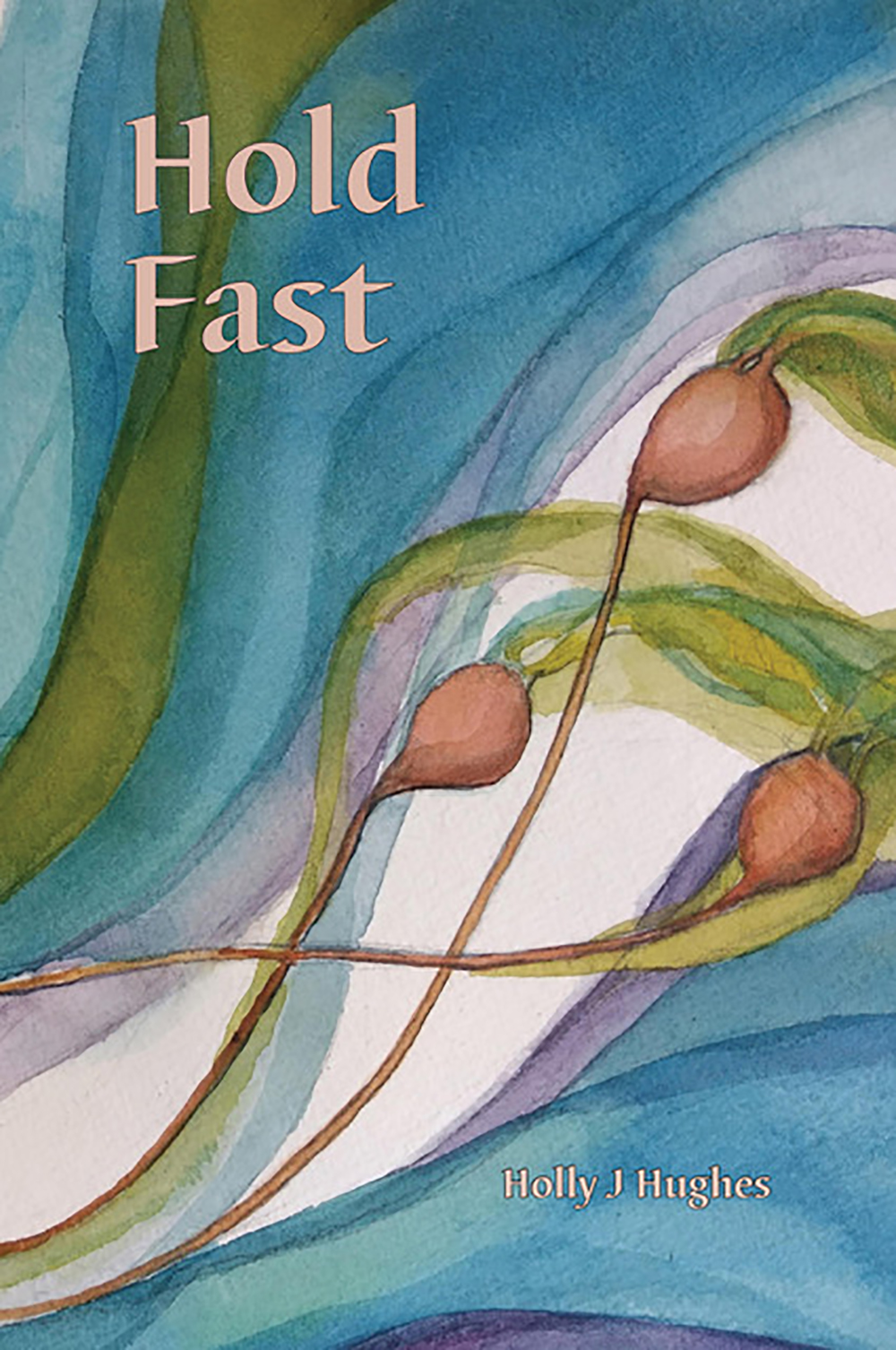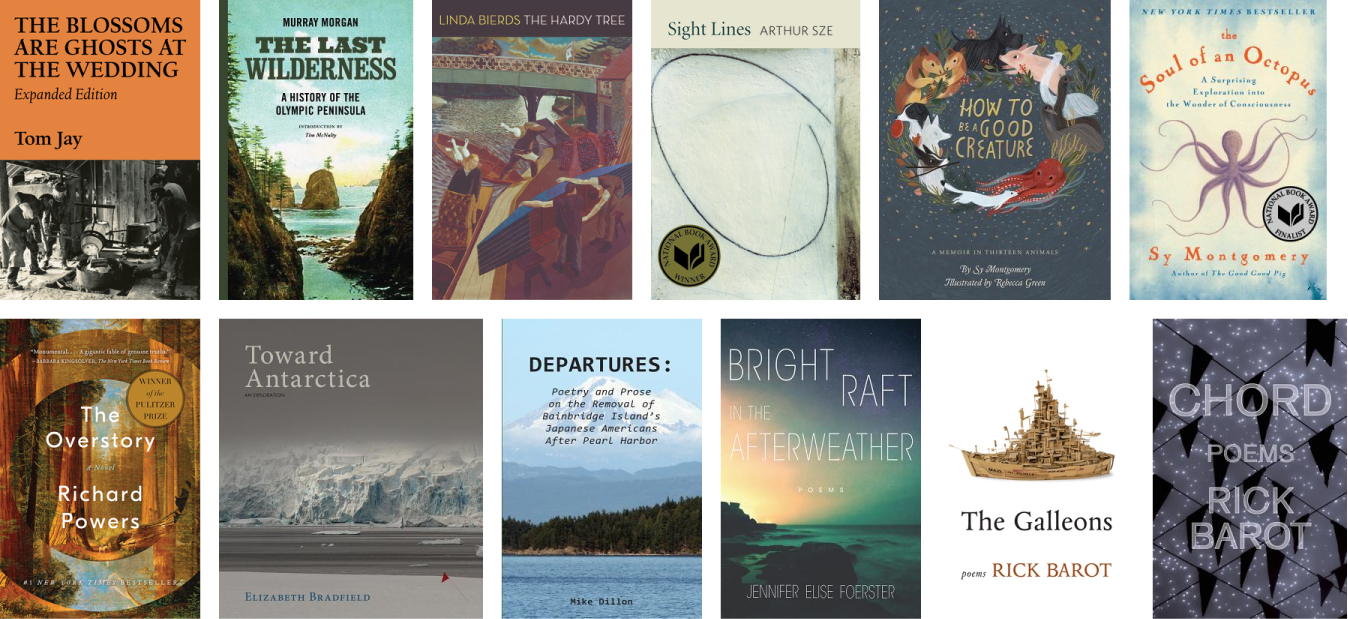Whatcha Reading, Holly J Hughes?
Every week we ask an interesting figure what they're digging into. Have ideas who we should reach out to? Let it fly: info@seattlereviewofbooks.com. Want to read more? Check out the archives.

Holly J Hughes is a poet living on the Olympic Penninsula. A former skipper, Alaskan salmon fisher, and ship naturalist, she now teaches writing workshops and consults as a writing coach. The author of four books of poetry, Sailing by Ravens, Boxing the Compass, and Passings, her latest work Hold Fast was just released in January of 2020. She'll be appearing tomorrow, Sunday February 23rd, at the Elliott Bay Book Company at 7:00pm.

What are you reading now?
First, a confession: I never read one book at a time unless I’m traveling and even then, I take as many as I can cram into my backpack (poetry generally wins—it’s easier to pack). And I confess that I often re-read books, so I have quite a list. This winter, I’m re-rereading books by writers we lost in the fall to keep their wisdom close. Tom’s Jay’s The Blossoms are Ghosts at the Wedding, was reissued in an expanded edition by Empty Bowl Press and now includes his classic Northwest essay, “Salmon of the Heart” as well as the more recent essay,“The Necessity of Beauty.” I share Tom’s fascination with the derivations of words, and admire how he manages to create a complex, conversational and relevant essay by following word roots back to their origin, as he does by exploring the definition of community, for example. My natural history book group is reading The Last Wilderness by Murray Morgan, which was re-issued with a foreword by fellow poet and friend Tim McNulty and I’m grateful for the chance to revisit it. (I was lucky to know Murray and can still picture his twinkling eyes and shock of white, slightly disheveled hair as I read his descriptions of the Iron Man of Hoh Valley, even if his descriptions of Chetzemoka might be questioned today). Linda Bierds’ The Hardy Tree came out in the fall from Copper Canyon Press but it’s a poetry collection that, as with all her meticulously researched and exquisitely-crafted collections, warrants careful reading and, in my case, re-reading. And when Arthur Sze’s Sight Lines won the National Book Award, I pulled it back off the shelf to celebrate, awed once again by the way Sze so seamlessly weaves together natural and human ecologies. (Check out his poem “Stilling to North.”) And yes, I’m reading nonfiction: Falter: Has the Human Game Begun to Play Itself Out? by Bill McKibben because I’m grateful for his steadfast dedication to activism. He takes on artificial intelligence and robotics in Falter, too, and the threat they pose to our sense of humanity, managing somehow to balance hard-nosed realism with a glimmer of optimism. And, as an antidote to despair, I’m reading How to Be a Good Creature: A Memoir in Thirteen Animals by Sy Montgomery because (I admit) I fell in love with the cover and the title—isn’t that enough?! So far, it’s exceeding my expectations with its even-handed blending of scientific fact, heart and humor. Whew.
What did you read last?
Another Sy Montgomery: The Soul of an Octopus (also for my book group), where my understanding of consciousness has been steadily raised to include not just the octopus, but most of our more-than-human neighbors, including trees and mycelium. (Yes, I read The Overstory, though it took almost a year—too big to fit in my backpack—and enjoyed the loosely interconnected stories of folks who love and listen to what trees have to say). For my poetry picks, I read Toward Antarctica by Elizabeth Bradfield, a refreshingly innovative travel memoir —equal parts documentary photojournalism, meditation, and elegy for the Lost Continent — which resurrects the Japanese haibun form and includes stunning color photographs chronicling the poet’s trips to Antarctica as a naturalist. (Disclaimer: my review is forthcoming in Terrain). I also appreciated the quietly powerful, haunting collection of poems—many of them prose poems—by haiku poet and former journalist Mike Dillon called Departures: Poetry and Prose on the Removal of Bainbridge Island’s Japanese Americans After Pearl Harbor for opening my eyes to what took place so close to home. And I’d wrapped up the summer with Bright Raft in the Afterweather, a second poetry collection from Jennifer Foerster, a member of the Muskogee nation, who dazzled me with her ability to simultaneously witness and redeem our broken world though the power of myth, story and haunting lyric.
What are you reading next?
I first read the title poem of Rick Barot’s The Galleons at least a year ago— and have been looking forward to the full collection since, having carried around his earlier collection Chord in my backpack for months. Now it’s out from Milkweed to well-deserved acclaim, so it’s at the top of the new reading pile. Next is Vanish, which won the Wandering Aengus Book Award, by Kevin Miller, another local poet I’ve long admired. And good news that former Washington State poet laureate Kathleen Flenniken’s Post Romantic is due out from University of Washington Press in the fall, so much to look forward to from our own talented poets. And in the meantime, I suspect a few more books will show up at my door, begging to be read—or re-read.